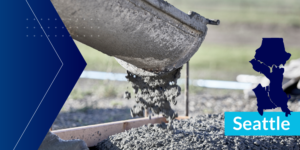
A major, months-long strike of Seattle, Washington concrete workers earlier this month when concrete workers agreed to return before negotiations had come to a conclusion. However, despite the return to work, people throughout all parts of the area’s construction industry are waiting for the concrete supply to come even close to normal.
The strike has had a huge impact on construction in the county, with more than 4.300 missed concrete deliveries leading to huge project delays and major layoffs among construction companies in the region.
“For months, the concrete companies have used their control over Seattle’s concrete industry to drag out negotiations, and it has been devastating for our community and for our sisters and brothers in the Building Trades,” said Teamsters Local 174 Secretary-Treasurer Rick Hicks. “Our members love our community and are returning to work for the people of Seattle.”
Workers made the decision to return to work after the area’s unions discussed first returning to certain projects — such as the city’s repairs to the West Seattle Bridge — which were of significant public interest. Workers began delivering concrete to the bridge on April 5, 2022, and announced the general return to work just three days later on April 8, 2022.
A joint statement from concrete suppliers Glacier Northwest, Stoneway, Salmon Bay and Cadman acknowledged that even with the workers back, the supply chain wouldn’t be back in full force immediately, saying “Each of the companies will now focus on rapidly ramping up operations to facilitate the workers’ return; it will take us time to get back to pre-strike levels.”
The situation even has some in the Seattle area wondering if there needs to be a new process in the region’s approach to the supply chain.
In late March 2022, prior to the end of the strike, King County Executive Dow Constantine proposed the possibility of the county building public concrete manufacturing facilities.
“Clearly, the local concrete industry is failing the people of King County, and I won’t let our region’s infrastructure hang in the balance,” said Constantine. “For the future of our infrastructure and our economy, the public sector must act to secure a reliable supply of concrete, even if that means manufacturing our own.”
Girmay Zahilay, co-sponsor of legislation that would authorize a study to explore the feasibility of these facilities, noted that the strike exposed many of the weaknesses in the supply chain across the county. There have been reports in other areas that even a few large facilities (such as massive Amazon warehouses) being worked on simultaneously can siphon off concrete for an entire region — even in areas as broad as the whole state of Florida.
“Without a functioning concrete industry, we won’t have the foundation to build homes, public transit, or healthcare facilities,” Zahilay said. “Indeed, countless projects have already stalled. This could be a matter of life and death for concrete workers and also for many others in our region.”